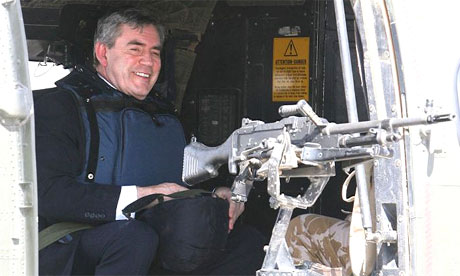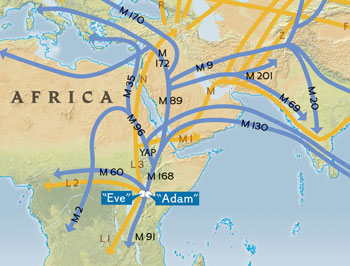‘Iran is friends with Israeli people’: Ahmadinejad aide
Iran is “friends with the Israeli people”, a deputy of President Mahmoud Ahmadinejad said, in stark contrast to Tehran’s usual verbal assaults against the Jewish state, local media reported on Sunday.
Esfandiar Rahim Mashaie, vice president in charge of tourism and one of Ahmadinejad’s closest confidants, also described the people of Iran’s arch-enemy the United States as “one of the best nations in the world”.
“Today, Iran is friends with the American and Israeli people. No nation in the world is our enemy, this is an honour,” Rahim Mashaie said, according to the Fars news agency and Etemad newspaper.
Editor’s Comment — For clarification, Mashaie later said: “It is preposterous to assume that any Iranian official would acknowledge the Zionist regime.” Even so, when one of the figures closest to the president in the Iranian government who is also the father of Ahmadinejad’s daughter-in-law makes a conciliatory gesture of this kind towards the Israelis, it somewhat undermines the neocons’ claim that Iran is intent on bringing about another holocaust.
When spies don’t play well with their allies
As they complete their training at “The Farm,” the Central Intelligence Agency’s base in the Virginia tidewater, young agency recruits are taught a lesson they are expected never to forget during assignments overseas: there is no such thing as a friendly intelligence service.
Foreign spy services, even those of America’s closest allies, will try to manipulate you. So you had better learn how to manipulate them back.
But most C.I.A. veterans agree that no relationship between the spy agency and a foreign intelligence service is quite as byzantine, or as maddening, as that between the C.I.A. and Pakistan’s Directorate for Inter-Services Intelligence, or I.S.I.
Poorly directed aid increases Afghanistan’s woes
It would be hard to deny the evidence that Afghanistan is at a crossroads as Democratic nominee Barack Obama yesterday met the country’s President Hamid Karzai. Despite the claims by some British officers that the Taliban is being tactically routed, no one seems to have told the Islamist insurgents. Opium production in the areas under their control – and that of other warlords – has reached new records this year. Corruption and criminality, linked often to the very heart of government, is endemic. Despite $15bn in aid that has been disbursed, Afghanistan remains mired in pervasive poverty with unemployment standing at more than 40 per cent. The country’s position as one of the world’s poorest has barely shifted since 2001.
Confronted with these multiple failures, the temptation, voiced yesterday by Obama, and by his Republican opponent John McCain already, is to throw more military forces at the problem in a replication of the Iraq ‘surge’. A parallel attraction, encouraged by Karzai, is to insist that the international community provide ever more money in the hope that some of the billions will stick. But in a country beset by rapidly increasing pessimism over the ability of the international community finally to bring to an end Afghanistan’s 30-year cycle of poverty and violence, what is needed is a large-scale rethinking of what we are doing in Afghanistan, not more violence and more largesse.
Editor’s Comment — The Observer is here endorsing/reiterating the views expressed by Rory Stewart in the latest issue of Time magazine.
The rap on Barack Obama, at least in the realm of foreign policy, has been that he is a softheaded idealist who thinks that he can charm America’s enemies. John McCain and his campaign, conservative columnists and right-wing bloggers all paint a picture of a liberal dreamer who wishes away the world’s dangers. Even President Bush stepped into the fray earlier this year to condemn the Illinois senator’s willingness to meet with tyrants as naive. Some commentators have acted as if Obama, touring the Middle East and Europe this week on his first trip abroad since effectively wrapping up the nomination, is in for a rude awakening.
These critiques, however, are off the mark. Over the course of the campaign against Hillary Clinton and now McCain, Obama has elaborated more and more the ideas that would undergird his foreign policy as president. What emerges is a world view that is far from that of a typical liberal, much closer to that of a traditional realist. It is interesting to note that, at least in terms of the historical schools of foreign policy, Obama seems to be the cool conservative and McCain the exuberant idealist.
We’re quick to damn the US but slow to see our own faults
President Obama is finally coming to Europe! All right, the Americans haven’t elected him … yet. But that’s a mere technicality as far as we’re concerned. We made up our minds long ago: our President is Barack Obama.
This week, Senator Obama will be giving a speech in Berlin, the headquarters of his biggest fan-base on the old continent. The Germans are rooting for America’s Democratic nominee with a fervour they otherwise reserve for the Dalai Lama or Nelson Mandela, bringing a distinctly wistful glint to the eyes of German politicians. Take Germany’s foreign minister Frank-Walter Steinmeier, a laconic Westphalian not known for flights of emotional exuberance. Even he, speaking at Harvard, could not resist bursting into an impassioned cry of: ‘Yes, we can!’
There are excellent reasons for Europeans’ enthusiasm. Obama is a charismatic politician of formidable stature, but so is John McCain. In fact, the choice before the Americans on 4 November is what Germans call a Luxusproblem: your problems, friends, we’d like to have. And despite America’s diminished stature, the President of the USA remains the most powerful man in the world, able like none other to make decisions of global consequence. In that sense, at least, he really is President of us all.
Barack Obama is on his way to Europe, where an adoring public awaits. But I wonder if the reception would be quite so enthusiastic if Obama’s fans across the Atlantic knew a dirty little secret of his remarkable presidential campaign: Although Obama portrays himself as the best candidate to engage the rest of the world and restore America’s image abroad, and many Americans support him for that reason, so far he has almost completely refused to answer questions from foreign journalists. When the press plane leaves tonight for his trip, there will be, as far as I know, no foreign media aboard. The Obama campaign has refused multiple requests from international reporters to travel with the candidate.
As a German correspondent in Washington, I am accustomed to the fact that American politicians spare little of their limited time for reporters from abroad. This is understandable: Our readers, viewers and listeners cannot vote in U.S. elections. Even so, Obama’s opponents have managed to make at least a small amount of time for international journalists. John McCain has given many interviews. Hillary Clinton gave a few. President Bush regularly holds round-table interviews with media from the countries to which he travels. Only Obama dismisses us so consistently.
Are U.S.-Iran ties undergoing significant change?
Events during the past month suggest that relations between the United States and Iran may be undergoing a significant change. Each development is not dramatic on its own, but as a whole they formulate a trend.
Iran has signaled that it intends to find a way out of the nuclear impasse. This began with a clear statement by Ali Akbar Velayati, adviser to Iranian Supreme Leader Ali Khamenei on foreign affairs. Velayati said that Iran should accept the “package” offered by the group of “five plus one” – the five permanent members of the Security Council and Germany, through the European Union official charged with foreign policy, Javier Solana.
Iran given two-week deadline to end the nuclear impasse
Iran was given a fortnight to agree to freeze its uranium enrichment programme yesterday or face further international isolation.
After a day of inconclusive talks in Geneva, a six-nation negotiating team warned the Iranian delegation that it had run out of patience and demanded a ‘yes or no’ answer to a proposal it put forward five weeks ago.
Under that offer, sponsored jointly by the US, Britain, France, Germany, Russia and China, Iran would not expand its uranium enrichment programme, while the international community refrained from imposing further sanctions. This phase would last six weeks, possibly paving the way for suspension of enrichment and more comprehensive talks.
U.S. talks with Iran exemplify Bush’s new approaches
With his moves last week involving Iraq, Iran and North Korea, President Bush accelerated a shift toward centrist foreign policies, a change that has cheered Democrats, angered some Republicans and roiled the presidential campaign.
Bush sent his first high-level emissary to sit in on nuclear talks with Iran, which ended without agreement Saturday. Also in the past two days, the president agreed for the first time to set a “time horizon” for withdrawing troops from Iraq, and authorized Secretary of State Condoleezza Rice to join North Korean diplomats at six-party talks about ending that country’s nuclear weapons program.
The maneuvers underscore how much the Bush administration has changed since 2002, when the president proclaimed Iraq, Iran and North Korea to be an “axis of evil.” Now Bush is pushing forward with diplomatic gestures toward Iran and North Korea while breaking with a long-held position on troop withdrawals in the interest of harmony with the Iraqi government.
White House tips press off to Maliki interview
The White House is quick to distribute its point of view in e-mail messages with headings like “News You Can Use,” “In Case You Missed It,” and “Setting the Record Straight.” So it was a surprise on Saturday morning when the White House distributed an article by Reuters that offered an endorsement of Senator Barack Obama’s Iraq policy by the leader of Iraq.
“Iraq PM backs Obama troop exit plan,” the headline read over a story about an interview of Prime Minister Nuri Kamal al-Maliki in the German magazine Der Spiegel, in which he expressed support for the senator’s plan to withdraw American combat brigades from Iraq over the next 16 months.
“U.S. presidential candidate Barack Obama talks about 16 months,” Mr. Maliki told Der Spiegel, Reuters reported. “That, we think, would be the right time frame for a withdrawal, with the possibility of slight changes.”
Turns out it was a mistake by the White House clipping service, which had intended to distribute it internally but instead sent it to thousands signed up to receive the administration’s press releases, transcripts, statements and other documents, drawing attention to an interview that might otherwise have received less.
Editor’s Comment — Kevin Drum suggests that the mistake resulted from the White House being so unnerved by the news, while the New York Times would have us believe that the White House error alerted the attention of the press.
I have little doubt that the Washington press corps is well supplied with flakes, but seriously, it shouldn’t have taken an email alert to bring attention to this story – even on a Saturday – when the press is monolithically focused on Obama’s trip to the region. Neither do I find the theory that a staffer in panic mode “hit the wrong button” particularly credible. How were the internal group list and the press list named, such that they could be mixed up?
No, while goofy mistakes are often believable, in this case it’s possible that someone in the White House was cunning enough to come up with an effective strategy for creating a distraction from the story. Look how the blogosphere reacted: More attention went to the email mistake than to what Maliki said!
Sunni bloc rejoins Iraqi government, amid reconciliation hopes
Iraq’s largest Sunni political bloc rejoined the government Saturday after a nearly year-long boycott, a move that could help bridge the country’s sectarian divide.
The return of the Iraqi Accordance Front is widely seen as a victory for Shiite Prime Minister Nouri al-Maliki and his efforts to portray himself as a nationalist leader uninfluenced by sectarian pressures.
“It means the success of the political process and the success of the security situation and of reconciliation,” said Adnan al-Dulaimi, leader of the bloc
The prospect of a long-term security arrangement between the United States and Iraq has become a lightning rod for criticism. Yet such an agreement — which the White House believes could be completed this month now that the two countries have agreed to set a “general time horizon” for reducing the number of American troops in Iraq — would be in the best interests of the governments of both countries, and of the people who live in a region of the world that urgently needs stability.
The United Nations Security Council resolution that authorizes coalition operations in Iraq expires at the end of this year. But the calendar is not the most important reason for the United States to enter into a long-term pact with Iraq. The opportunity presented by the improved situation on the ground begs to be exploited lest it disappear in the ever-shifting sands of Middle East strife.
Are the desires of the American people and the Iraqi people different? I don’t think so. During my year in command of all American forces in the Middle East, I met often with Iraqis of all walks of life. Discussions with people — from Prime Minister Nuri Kamal al-Maliki to clerics, governors and generals to men in the streets of Baghdad and towns and cities throughout the country — left me with several strong impressions. The top objective of both countries is security and stability in the region. Letting Iraq’s security forces assume responsibility for their country is another mutual goal. Withdrawing the vast majority of American and coalition troops from Iraq as soon as possible is a clear priority.
Gordon Brown agrees to cut British troops in Iraq
Gordon Brown, on a flying visit to Baghdad and Basra, said today he plans to reduce the remaining number of British troops in Iraq following a drop in attacks, but declined to set a timeframe for their departure.
An Iraqi Government official said he hoped British forces would exit within a year.
The British Prime Minister also agreed with Nouri al-Maliki, his Iraqi counterpart, to set up two teams, Iraqi and British, to study the technicalities of Britain’s long-term relationship with Iraq.

Editor’s Comment — Gordon Brown is to the Labour Party what John Major was to the Conservatives: someone upon whom a shadow has permanently been imprinted. Even so, there’s something perversely intriguiging about a man who can wear a dark suit and tie and flack jacket when it’s 126 degrees Fahrenheit!
The Bush administration has been a waging a fierce battle for the power to lock people up indefinitely simply on the president’s say-so. It scored a disturbing victory last week when a federal appeals court ruled that it could continue to detain Ali al-Marri, who has been held for more than five years as an enemy combatant. The decision gives the president sweeping power to deprive anyone — citizens as well as noncitizens — of their freedom. The Supreme Court should reverse this terrible ruling.
Mr. Marri, a citizen of Qatar legally residing in the United States, was initially arrested in his home in Peoria, Ill., on ordinary criminal charges, then seized and imprisoned by military authorities. The government, which says he has ties to Al Qaeda, designated him an enemy combatant, even though it never alleged that he was in an army or carried arms on a battlefield. He was held on the basis of extremely thin hearsay evidence.
It’s the economic stupidity, stupid
The best thing to happen to John McCain was for the three network anchors to leave him in the dust this week while they chase Barack Obama on his global Lollapalooza tour. Were voters forced to actually focus on Mr. McCain’s response to our spiraling economic crisis at home, the prospect of his ascension to the Oval Office could set off a panic that would make the IndyMac Bank bust in Pasadena look as merry as the Rose Bowl.
“In a time of war,” Mr. McCain said last week, “the commander in chief doesn’t get a learning curve.” Fair enough, but he imparted this wisdom in a speech that was almost a year behind Mr. Obama in recognizing Afghanistan as the central front in the war against Al Qaeda. Given that it took the deadliest Taliban suicide bombing in Kabul since 9/11 to get Mr. McCain’s attention, you have to wonder if even General Custer’s learning curve was faster than his.
Mr. McCain still doesn’t understand that we can’t send troops to Afghanistan unless they’re shifted from Iraq. But simple math, to put it charitably, has never been his forte. When it comes to the central front of American anxiety — the economy — his learning curve has flat-lined.
Leaving Israel a different man
In 1979, at the age of 16, Samir Kuntar led an armed team by boat from Lebanon to the seaside Israeli city of Nahariya to kill and kidnap Israelis. He was in a war against the Zionist state, but he knew almost nothing about the people or the country. The only Hebrew word he knew was shalom – peace – an irony that does not escape him today. That night he made an attack and was caught and convicted of killing a policeman, a second man and his six-year-old daughter.
Thirty years later – spent entirely in Israeli prisons – the 46-year-old man speaks fluent Hebrew without a trace of an accent. He reads Israeli authors, is up-to-date on Israeli pop culture and knows more about the Holocaust and Zionism than many Israelis.
On Wednesday, Israel released Mr. Kuntar as part of a prisoner exchange. It was a tough decision for the government because Mr. Kuntar had become an icon of terror and evil for Israeli society. Yet, before he left Israel for freedom he sent his collection of Israeli books to his home in Lebanon.
None of that would probably have been public were it not for a chance meeting between Mr. Kuntar and Chen Kotas-Bar, a Jewish Israeli journalist, in the prison library in January, 2004. Their short conversation ignited her interest – and his, she says – and the two met often after that. The result was two articles in the Maariv newspaper: one in 2005 and the other published yesterday. The articles reveal a man very different from the teenager who first arrived on Israeli shores.
Marc Sageman has charted an unlikely path. The first scholar-in-residence at the New York City Police Department survived the Holocaust to become a psychiatrist, a sociologist and a CIA case officer. Since the publication of “Leaderless Jihad” earlier this year, Sageman has been at the center of a debate about the inner workings of Al Qaeda. Is the organization dispersed and disorganized, as Sageman suggests, or is it resurgent, as CIA analyses have reported? Sageman spoke with Newsweek’s Christopher Dickey in New York.



 Mr. Diveroli, whose tousled, slightly confused visage recalls the perpetually stoned Jeff Spicoli from the 1982 film “Fast Times at Ridgemont High,” was the improbable recipient of a 2007 government contract to supply ammunition to our allies in Afghanistan.
Mr. Diveroli, whose tousled, slightly confused visage recalls the perpetually stoned Jeff Spicoli from the 1982 film “Fast Times at Ridgemont High,” was the improbable recipient of a 2007 government contract to supply ammunition to our allies in Afghanistan.